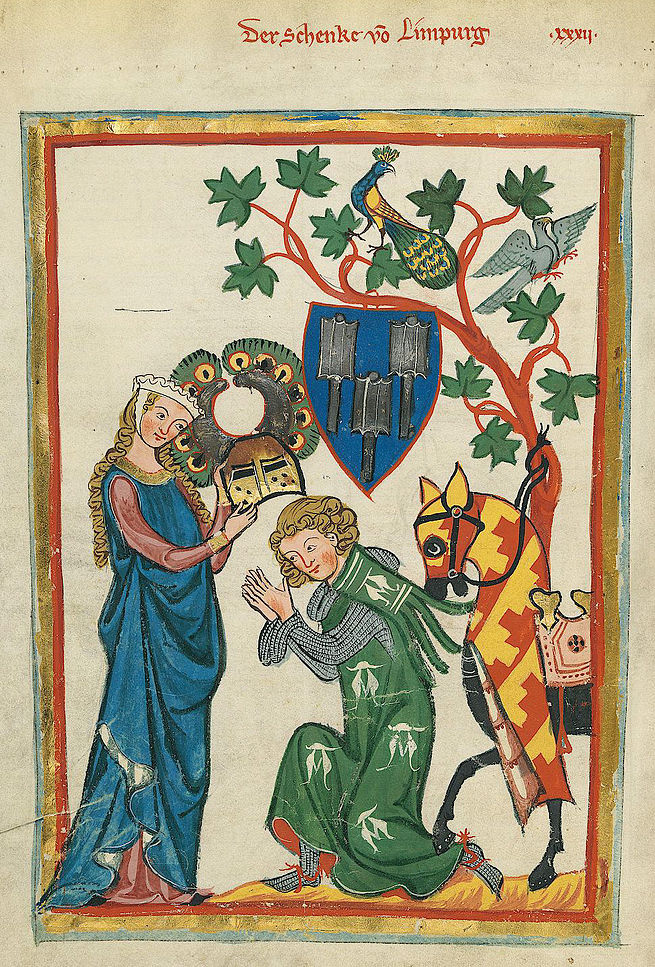-
Chivalry
Chivalry, or the chivalric code, is an informal, varying code of conduct developed between 1170 and 1220, but never decided on or summarized in a single document. It was associated with the medieval Christian institution of knighthood; knights’ and gentlewomen’s behaviours were governed by chivalrous social codes. The ideals of chivalry were popularized in medieval literature, especially the Matter of Britain and Matter of France, the former based on Geoffrey of Monmouth’s Historia Regum Britanniae, written in the 1130s, which introduced the legend of King Arthur. All of these were taken as historically accurate until the beginnings of modern scholarship in the 19th century.
The code of chivalry that developed in medieval Europe had its roots in earlier centuries. It arose in the Holy Roman Empire from the idealisation of the cavalryman—involving military bravery, individual training, and service to others—especially in Francia, among horse soldiers in Charlemagne’s cavalry. The term “chivalry” derives from the Old French term chevalerie, which can be translated as “horse soldiery”. Originally, the term referred only to horse-mounted men, from the French word for horse, cheval, but later it became associated with knightly ideals.Over time, its meaning in Europe has been refined to emphasise more general social and moral virtues. The code of chivalry, as it stood by the Late Middle Ages, was a moral system which combined a warrior ethos, knightly piety, and courtly manners, all combining to establish a notion of honour and nobility.
-
Honor (noun)
recognition of importance or value; respect; veneration of someone, usually for being morally upright and/or competent
“The crowds gave the returning general much honor and praise.”
-
Honor (noun)
the state of being morally upright, honest, noble, virtuous, and magnanimous; excellence of character; the perception of such a state; favourable reputation; dignity
“He was a most perfect knight, for he had great honor and chivalry.”
“His honor was unstained.”
-
Honor (noun)
a token of praise or respect; something that represents praiseworthiness or respect, such as a prize or award given by the state to a citizen
“Honors are normally awarded twice a year: on The Queen’s Birthday in June and at the New Year.”
“He wore an honor on his breast.”
“military honors; civil honors”
“Audie Murphy received many honors, such as the Distinguished Service Cross.”
-
Honor (noun)
a privilege
“I had the honour of dining with the ambassador.”
-
Honor (noun)
the privilege of going first
“I’ll let you have the honours, Bob—go ahead.”
-
Honor (noun)
a cause of respect and fame; a glory; an excellency; an ornament.
“He is an honour to his nation.”
-
Honor (noun)
a seigniory or lordship held of the king, on which other lordships and manors depended
-
Honor (noun)
the center point of the upper half of an armorial escutcheon honour point}}
-
Honor (noun)
In bridge, an ace, king, queen, jack, or ten especially of the trump suit. In some other games, an ace, king, queen or jack.
-
Honor (noun)
(courses for) an honours degree: a university qualification of the highest rank
“At university I took honours in modern history.”
-
Honor (verb)
to think of highly, to respect highly; to show respect for; to recognise the importance or spiritual value of
“The freedom fighters will be forever remembered and honored by the people.”
-
Honor (verb)
to conform to, abide by, act in accordance with (an agreement, treaty, promise, request, or the like)
“I trusted you, but you have not honored your promise.”
“refuse to honor the test ban treaty”
-
Honor (verb)
to confer (bestow) an honour or privilege upon (someone)
“Ten members of the profession were honored at the ceremony.”
“The prince honored me with an invitation to his birthday banquet.”
-
Honor (verb)
to make payment in respect of (a cheque, banker’s draft, etc.)
“I’m sorry Sir, but the bank did not honour your cheque.”
-
Chivalry (noun)
Cavalry; horsemen armed for battle.
-
Chivalry (noun)
The fact or condition of being a knight; knightly skill, prowess.
-
Chivalry (noun)
The ethical code of the knight prevalent in Medieval Europe, having such primary virtues as mercy towards the poor and oppressed, humility, honour, sacrifice, fear of God, faithfulness, courage and utmost graciousness and courtesy to ladies.
-
Chivalry (noun)
Courtesy, respect and honourable conduct between opponents in wartime.
-
Chivalry (noun)
Courteous behaviour, especially that of men towards women.
-
Chivalry (noun)
A tenure of lands by knightly service.

